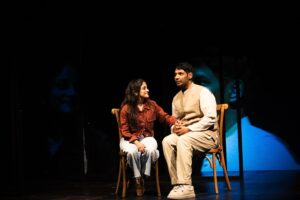Jessica Harris is at Birmingham Rep for a powerful Tara Theatre production.
A highly personal and moving piece of theatre, Silence deals with the 1947 partition of the Indian sub-continent following the dissolution of the British Raj. In doing so, it turns full circle in its message about the importance of inclusion and of the need for people to come together. Yet, gripping though it is, the production is light on the wider historical and political context of partition, and of why events developed in the way they did following the British withdrawal.
Described by Tara Theatre as a play focussed on ‘communal story-telling’, Silence uses the personal testimonies of people who lived through the aftermath of British rule in India and who experienced the country’s partition, including enforced migration, loss of homeland, carnage and sexual violence. Delivered directly to the audience, the testimonies are graphic in their description of brutality, and the soundtrack with its strong beat and fast pace adds to the sense of fear and chaos.
Black and white back projections of the actors emphasise the poignancy of the stories, and the piece is lifted by some powerful performances, notably that of Asif Khan who variously plays Jasvir, Kulvinder and James. Many accounts contain memorable words: “When you’re landless, you carry your culture with you,” says an elderly woman.

The piece is framed by younger people encouraging their parents and grandparents, now in the UK, to talk of their experiences of partition, when the sub-continent was divided into a largely Hindu and Sikh India and a largely Muslim Pakistan. It starts with a young couple, Zara, a Muslim, and Sami, a Hindu, talking about how their impending wedding will bring their families together, and how they want to have a better understanding of their past. It ends with a daughter, whose Hindu father lived through the days of partition, planning her first visit to the city of Lahore, once her father’s home and now within Pakistan.
The play reveals a silence that has prevailed since 1947, the pain of the memories being overwhelming for many. It also sheds light on the impact on those who subsequently moved to Britain, and on how divisions between communities have sometimes remained, although the racism they have known is often a shared experience. For some, faith is not the defining factor of nationality: “Soil is more precious than religion,” says one man.
Factual information augments the personal accounts. After 400 years of British dominion, including that of the East India Company, Mountbatten, India’s last viceroy, decided the country should be divided up in just twelve weeks, whilst Radcliffe, responsible for determining the partitioning of the provinces of Punjab and Bengal (both with significant populations of Muslims, Hindus and Sikhs) had never been to India. Twelve million people or more migrated in both directions and one million died. The trauma suffered by those who survived lives on.
But, aside from fleeting references to Nehru and Gandhi, there is little mention of the events which led to partition and little analysis of why the British acted with such haste in redrawing the map of India with such disastrous consequences.
We are left to concur that people need to come together, and that documenting previously unheard voices is important. But until we speak out about the wider politics, silence may still be an understandable response.
Silence uses Kavita Puri’s book Partition Voices: Untold British Stories as source material. It was written by Sonali Bhattacharyya, Gurpreet Kaur Bhatti, Ishy Din and Alexandra Wood, and directed by Iqbal Khan.
Silence was presented by Tara Theatre in association with Queen’s Theatre Hornchurch, from an original co-production by Tara Theatre and Donmar Warehouse.
It runs at the Rep until 27th April. Further information can be found at birmingham-rep.co.uk.
Pics – Harry Elleston


